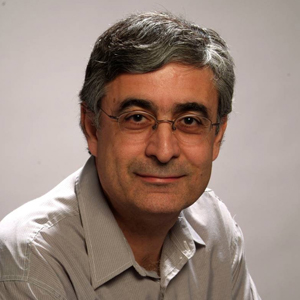ACDC: What’s in the name?
Having a distinct name like Eleftherios gives you a lot of advantages. People never ask you to spell your name, and they remember it without much trouble.
Ha! If only!
 Eleftherios Diamandis and graduate students from the ACDC lab in tribute mode
Eleftherios Diamandis and graduate students from the ACDC lab in tribute mode
When I make restaurant reservations, I simplify things by going with the name Elvis. Nobody has ever asked me to spell it, and I get a smile in return. When people ask me for the name of my research laboratory, I reply, “the ACDC lab.”
The usual response is, “I’ve heard that name before. Is it a band from the ’70s?”
But of course it is. And the follow-up question is always, “Does your lab’s name have anything to do with the band?”
Well, it does and it doesn’t. The name was chosen many years ago for two reasons: to celebrate one of my all-time favorite rock bands, AC/DC, and to outline the scope of my research laboratory – ACDC stands for Advanced Centre for Detection of Cancer.
I have tried repeatedly to reach out to AC/DC and let them know about the research laboratory that shares their name and is devoted to fighting cancer, but with no success. In fact, not only is the lab named after them, but to celebrate the music of AC/DC, we formed a rock band within the lab with me representing Angus Young (lead guitarist and music composer) and my graduate students playing the other members. We created a poster and shot a video of the AC/DC song “ Chase the Ace.”
Until recently, I thought naming a research lab after a rock band was rather unique. That changed when, in 2014, I met my friend and fellow physician and scientist Steven Boyages from Australia. Boyages revealed that he’d created a digital communications company and named it “Red Zeppelin” to celebrate the legendary rock band Led Zeppelin. The name is meant to connote inspiration, and capture the imagination and innovation of the band.
Enjoy reading ASBMB Today?
Become a member to receive the print edition four times a year and the digital edition monthly.
Learn moreGet the latest from ASBMB Today
Enter your email address, and we’ll send you a weekly email with recent articles, interviews and more.
Latest in Opinions
Opinions highlights or most popular articles

Women’s health cannot leave rare diseases behind
A physician living with lymphangioleiomyomatosis and a basic scientist explain why patient-driven, trial-ready research is essential to turning momentum into meaningful progress.

Making my spicy brain work for me
Researcher Reid Blanchett reflects on her journey navigating mental health struggles through graduate school. She found a new path in bioinformatics, proving that science can be flexible, forgiving and full of second chances.

The tortoise wins: How slowing down saved my Ph.D.
Graduate student Amy Bounds reflects on how slowing down in the lab not only improved her relationship with work but also made her a more productive scientist.

How pediatric cataracts shaped my scientific journey
Undergraduate student Grace Jones shares how she transformed her childhood cataract diagnosis into a scientific purpose. She explores how biochemistry can bring a clearer vision to others, and how personal history can shape discovery.

Debugging my code and teaching with ChatGPT
AI tools like ChatGPT have changed the way an assistant professor teaches and does research. But, he asserts that real growth still comes from struggle, and educators must help students use AI wisely — as scaffolds, not shortcuts.

AI in the lab: The power of smarter questions
An assistant professor discusses AI's evolution from a buzzword to a trusted research partner. It helps streamline reviews, troubleshoot code, save time and spark ideas, but its success relies on combining AI with expertise and critical thinking.

